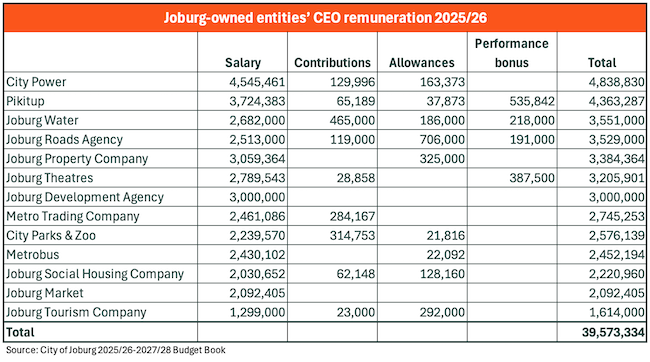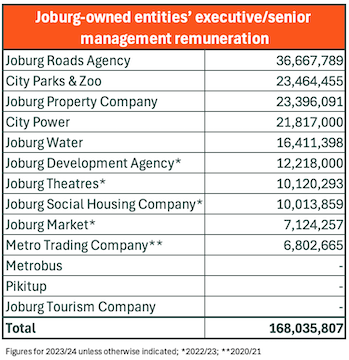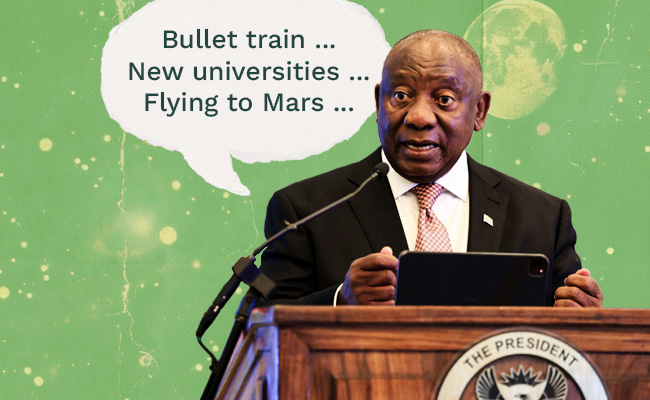At last count, President Cyril Ramaphosa was set to earn R4.3m in 2025/26. That’s not bad by international standards – it’s roughly on par with UK Prime Minister Keir Starmer, and ahead of French President Emmanuel Macron.
So you’ll be delighted to hear that Joburg has pencilled in the same for the MD of refuse removal agency Pikitup, Bukelwa Njingolo, according to the city’s new budget book, including a R535,842 performance bonus.
And, scarily, Njingolo isn’t even tops in Joburg. The book shows the metro has budgeted R4.84m for the CEO of City Power, an entity which has battled to do the very basics of its job.
That’s only half a million more than the president – and the UK PM. And it’s an unbelievable 55% increase on CEO Tshifularu Mashava’s 2023/24 package, and a 48% increase in her basic salary over just two years.
If you’re looking for a reason why the City of Joburg has to keep hiking the price of utilities and rates by far more than the country’s inflation rate of about 3%, here it is in glorious technicolour.
All this, despite the fact that City Power’s management makes a barrel of meerkats look like a paragon of organisational virtue.
This is an entity that struggles to keep the lights on, with almost 100,000 outages reported in the nine months from July 2024 to end-March 2025, according to a Daily Maverick data crunch.
City Power also has a repairs backlog of R44bn – up from R26bn in 2022, which implies a backslide of R18bn in three short years.
Then there’s the utility’s chaotic finances: last year, City Power ran a deficit of R2.84bn, with liabilities exceeding assets by R1.17bn. And there’s irregular expenditure of R4.39bn – after a write-off of R1.43bn.
If that’s not enough, there are apparently all sorts of shenanigans going on too. News24 reports accusations of nepotism against Mashavu, who seemingly hired family members for positions over more qualified candidates (she’s denied any dodgy dealings). There are also the three union members who were allegedly hired as electrician team leaders despite lacking the qualifications or experience. Not exactly who you want dealing with high-voltage infrastructure that’s already decrepit.
Damningly, the utility allegedly spent R335m on failed maintenance and infrastructure projects, paying ostensibly fraudulent invoices. At the same time, City Power forked out R25,000 for Bic pens and R17,200 for air freshener. Presumably to mask the stench of inflated invoices. And it reportedly paid a consulting firm R55m for work that should be the responsibility of executive management.
Does this strike you as an organisation whose CEO deserves a R4.84m salary?
Serial underachievers
Then there’s the R3m-plus club. Nudging Deputy President Paul Mashatile’s projected R3.7m income for 2025/26 is Joburg Water head Ntshavheni Mukwevho, with a budgeted R3.6m package.
Lord alone knows why, but this includes a bonus of R218,000. Remember, Joburg Water, through its atrocious planning, caused taps to run dry for nearly a week across entire swathes of the city.
This is an entity that loses more than 35% of the water it gets; it chronically underinvests in infrastructure; and has frequent outages and restrictions. Triage over service.
The utility has an immediate renewal backlog of R26.6bn, and needs R58.8bn for replacement of critical assets, wastewater treatment works and network upgrades over five years.
It can’t guarantee water in the taps – or clean tenders when the taps run dry, apparently. Investigative outfit amaBhungane reports that the utility awarded a R263m water tanker contract to two obscure companies run by 20-somethings – coming, of course, with a side order of alleged price manipulation, and the whiff of collusion and fronting.
But Mukwevho isn’t alone. Rivalling him is the head of the Joburg Roads Agency (JRA), at a budgeted R3.5m – inclusive of a R191,000 bonus, also for dud services.
This is an entity that presides over potholes, invisible road markings, and defunct traffic and streetlights. And the 10,700-odd gaping “reinstatements” it had yet to close by the end of last year. Never mind that phase 1 of the repair of Lilian Ngoyi Road – wrecked in an explosion in mid-2023 – has still not been completed.
The backlog at the JRA sits at R276bn. And that’s not just road surfacing; about 20 of the city’s bridges are on the brink of closure, according to Rapport. And about 78% were considered to be in poor or very poor condition eight years ago already – the last time a visual assessment of the city’s bridges was conducted.
There’s also the CEO of the Joburg Property Company (JPC), with R3.4m. This is a handsome package for an entity where top executives came off badly in a Special Investigating Unit probe into R18.56m worth of dodgy PPE contracts during Covid.
And there’s the fact that the company manages a property portfolio north of R10bn, yet fritters away ratepayers’ cash by leasing private properties. “Property management” in name only, it seems.
And don’t forget that the JPC – and its CEO, Helen Botes – were held at least partly responsible for the devastating Usindiso Building fire, in which 77 people died.
Aside from water, power and property, there’s also the Joburg Development Agency, whose CEO is set to earn R3m. Never mind that it only took that entity years to reopen the city’s library.
And, can you believe it, the Joburg City Theatres CEO comes in at a total package of R3.2m (bonus: R387,500).
Last year, Sello Makhubela was appointed acting CEO of the Joburg Market despite reportedly facing four charges of fraud related to a municipal lighting contract in Rustenburg. Which says much about the city’s vetting. And yet, the Market CEO’s salary is set at R2.1m for 2025/26.
Taken together, the CEOs of Joburg’s entities are budgeted to cost us R40m this year – all for leading a metro that is sliding sharply in pretty much all the service rankings you can think of.
It tells you all you need to know about accountability in local government, and why so many South Africans feel cadres are gorging themselves at the trough while the country is collapsing.

Cutting the fat
Now, South Africa has a grand total of 53 municipal-owned entities. Thirteen of them – a quarter – are in Joburg. (Cape Town, the second-largest city in the country, has two.)
It’s clear that this is an obscene amount. Particularly as, for the most part, these municipal-owned entities could simply be folded into the city’s 11-odd departments.
But that, of course, would mean their heads would be paid commensurate salaries – heads of departments earn an average of R2.2m – rather than the outlandish sums they’re taking home now.
There’s no reason, for instance, that Joburg City Theatres couldn’t find a home in the community development department; the Joburg Social Housing Company (Joscho) in human settlements; the Joburg Tourism Company in economic development; or Metrobus in transport.
Only, that would require cutting the fat, and wasting less taxpayer money on paying the fat cats. And evidently there is close to zero political appetite to do the right thing.
But wait, that’s not all. Wait until you hear about … the boards.
You see, as a state-owned entity, each of these 13 units comes with its own board. And these aren’t small boards, mind you: on the whole, they have about 11 nonexecutive directors – even for small entities like Joburg City Theatres, Joburg Tourism and Joshco.
To give you a sense of the waste, consider the comparison between the governance of Joshco and JSE-listed Mantengu Mining.
Both make about the same amount of revenue – Mantengu made R317m last year, while Joshco made R311m – yet, the private company has just three non-executive directors, compared to the state entity’s 10.
Or compare Premier Foods – another JSE-listed entity, which made R19.9bn last year – to City Power, which made about the same. Again, Premier Foods has six non-executive directors, City Power has 10.
And hold on: senior management incoming …
Again, because each entity is a standalone, it has its own layer of senior management – CFOs, COOs, company secretaries and executive managers. At the JPC, for example, the executive management team earned R23.4m in 2023/24.
Taken together – drawing on most recent available figures – the executive and senior management teams of Joburg’s municipal-owned entities cost the ratepayer upwards of R168m a year.

It’s all part of a labyrinthine structure characterised by wanton spending and a bureaucracy that exists for little reason other than to perpetuate itself.
Consider the gushing water, pockmarked roads, decrepit infrastructure, decaying and abandoned buildings, poverty, crime and joblessness, and it’s clear the bloated bureaucracy is working about as well as the city’s traffic lights.
If you need an object lesson in how not to run a city, Joburg is Exhibit A.
Top image: Rawpixel/Currency collage.
Sign up to Currency’s weekly newsletters to receive your own bulletin of weekday news and weekend treats. Register here.













Disgusting.
Indeed
The sad thing is that voters continue to vote for the parties who exist only to supply patronage to their members. Sadly, even if a new administration were to come in, SA’s labour laws would make it impossible or mind bogglingly expensive to get rid of these parasites.
I am just so sick of this…
Shame on them !!! Disgusting
50 percent increase how do you justify that for poor poor service delivery.
These people are SICK.
That is just the ANC at the feeding trough what a bloody disgrace. And Cyril does nothing he is just a useless puppet.
Legalized day light robbery. It’s wrong that we have to pay more for their salaries while our services decrease
Hahahahahaha, here’s an idea, vote ANC again, maybe it’ll work this time.
Digusting, shameful.
God says there is a special place for people who cause others malicious harm on purpose. Be aware God is watching.
An excellent article.
Shameful waste of ratepayers’ and residents’ money.
This is infuriating to say the least